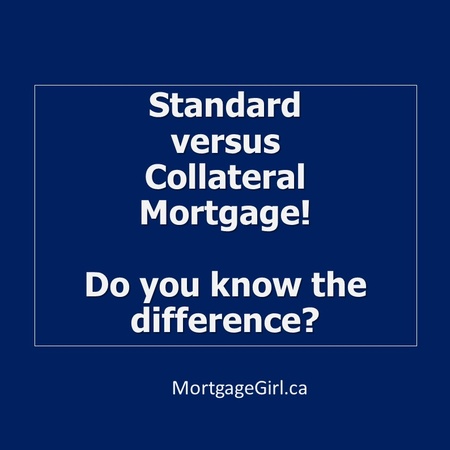Do you know if your mortgage is a collateral or a standard charge? You should

Given all of the mortgage products with many different lenders available these days, I would say it’s a good time to remind all to read the fine print in any and every contract put in front of you. If you don’t understand something, you need to ask the questions. As the mortgage interest rates start to significantly increase, do be aware of exactly what you are getting into when borrowing and paying down the largest debt most of us will ever have in our lifetimes.
Important to be aware that if you have just a mortgage, that is what will be discussed below when detailing the differences between a collateral and a standard charge. If you have or want a mortgage plus another product such as a line of credit(s) or credit card(s) all under one registration against your land title, that will usually be registered under a collateral charge as it allows the balance of the loan to float up or down depending on the customers use.
What is a collateral charge mortgage?
- The debt is a promissory note or other loan agreement, and the mortgage is “collaterally secured” meaning your house is extra security for the loan.
- If at any time a borrower misses a payment and if the lender chooses to, they can request immediate payment in full of the full loan amount and not just for the missed payment. This could also be for non-payment of property taxes, insurance or condo fees.
- If the loan is not paid out in full as requested, the file could immediately be sent to the lenders lawyer for collection and foreclosure proceedings could commence
- As a result, any other lenders may not be interested in taking over the mortgage or if any do, it will likely be with higher interest rates and significant upfront fees.
- Majority of second mortgage lenders are not interested in going behind a collateral 1st charge because the balance outstanding in case of default on that 1st charge can significantly increase which means going in 2nd place is much riskier.
- How can the 1st mortgage balance increase you ask? The collateral charge mortgage also includes ALL unsecured debt under that one charge if held with that same lender. If you default on any of those other debts which are then called for payment in full and the home is sold, the lender is allowed to demand that ALL debts held with them be paid in full from the home sale proceeds
- Another issue I have seen with this type of charge is many of these lenders will register above the amount initially advanced. The reason they say is if you ever wish to access more equity they will advance additional funds without having to go through the registration process again.
- The problem with that is if you can get a better rate elsewhere or they decline you, you will have to then take your mortgage elsewhere to get more money which equates to more costs for you
- And lastly, the collateral charge at renewal date is difficult to transfer to a different lender for a better rate. This means you can’t just “switch” for free like you can with regular standard charge mortgages as you will likely have to pay registration and appraisal fees which could total upwards of $1,500. You are still free to move your business to another lender, though not all lenders will accept collateral charge mortgages.
What is a standard charge mortgage?
- With a standard charge mortgage, this “regular” mortgage is the ONLY security for the debt.
- Under this type of charge if the borrower misses a payment, they have the ability to make up that payment and the lender must honour that mortgage agreement to the scheduled renewal date. Plenty of time to restructure their finances to ensure it doesn’t happen again.
- Under a standard charge, as the mortgage document clearly details the terms to pay down the mortgage, a 2nd mortgage holder would feel more secure going behind the 1st mortgage
- At the end of their term, they have the option to renew with the current lender or switch for free to a different lender with favorable rates and no additional fees
If you believe you will never have trouble making the payments or may want to refinance down the road to access additional equity, then a collateral charge mortgage may be a wise choice for you. Though, if your goal is to pay off your mortgage as quickly as possible then a regular standard charge mortgage will suit you just fine.
Deciding whether to get a standard or collateral mortgage adds another layer of complication for homebuyers and owners. Before signing off on any mortgage offering, make sure you are getting advice from a true “professional” who truly understands the complexity of mortgages and can help you to make an informed decision on what options are right for your particular situation. Ask the hard questions to ensure there is less chance of regretting your choices at some future date.
Contact the MortgageGirl today for more details. Visit her website MortgageGirl, Contact her via phone 780-433-8412 or email info@mortgagegirl.ca. Follow her on Facebook (MortgageGirl.ca), Twitter (MortgageGirlca) or on Instagram (MortgageGirl.ca)